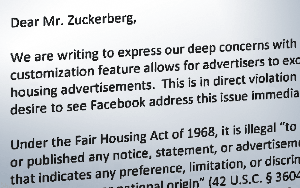 A group of black lawmakers are calling on Facebook CEO Mark Zuckerberg to revise a targeting feature that reportedly enables marketers to prevent ads, including housing and job ads, from being shown
to minorities.
A group of black lawmakers are calling on Facebook CEO Mark Zuckerberg to revise a targeting feature that reportedly enables marketers to prevent ads, including housing and job ads, from being shown
to minorities.
"It is our sincere hope that the advent of this customization microtargeting feature was to be innovative and efficient, and that Facebook did not wittingly create this feature
with the purpose of separating communities or violating federal civil rights law," Reps. Robin Kelly, G.H. Butterfield, Emmanuel Cleaver and Yvette Clarke wrote in a letter sent to Zuckerberg on
Tuesday.
The lawmakers, members of the Congressional Black Caucus, call on Zuckerberg to "remedy this matter swiftly and responsibly."
The letter comes several days after ProPublica reported that Facebook enables advertisers to prevent their ads from being shown to
users who belong to certain "ethnic affinity" groups -- including people the social networking believes have an ethnic affinity of black, Asian-American and Hispanic.
advertisement
advertisement
It's illegal to publish
housing or job ads that discriminate based on factors including race, religion, sex and national origin.
ProPublica reported that it was able to use Facebook's self-service tool to create an
ad for an event aimed at renters, and then block it from pages of users with black, Asian-American or
Hispanic ethnic affinities.
The lawmakers ask Zuckerberg to outline how its "ethnic affinity" targeting feature is used in housing ads, and what steps the company is taking to ensure it isn't
"empowering discriminatory housing practices."
Facebook's Christian Martinez, head of multicultural marketing, said in a blog post that the company's policies prohibits advertisers from
excluding minorities from job or housing ads. "If we learn of advertising on our platform that involves this kind of discrimination, we will take aggressive enforcement action," he wrote.
On Tuesday, a Facebook spokesperson added that multicultural marketing "is a
common practice in the ad industry and helps brands reach audiences with more relevant advertising."
The spokesperson added: "We've heard from groups and policy makers who are concerned about
some of the ways our targeting tools could be used by advertisers. We are listening and working to better understand these concerns."